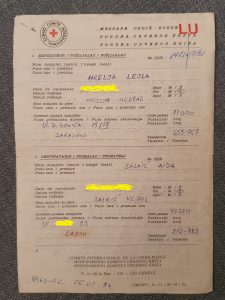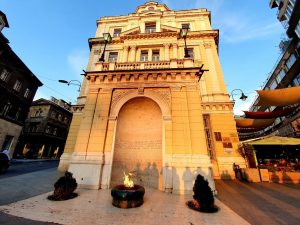HMDT blog: Shining a light for young people today
Aida was just 18 years old when war broke out in Bosnia and she became an interpreter for the UN, working on the frontline of a warzone. For our blog, Aida told us about her experiences. She is now a light in the darkness for the young people she works with, sharing her story and giving them hope that they can overcome their difficulties.

Image: Aida at a Remembering Srebrenica memorial in London, 2019.
Aida was born in Cazin, a town in a Muslim enclave in the country previously known as Yugoslavia, now northwest Bosnia. She had just turned 18 when the war broke out and had been looking forward to her prom and starting university. At 18 she didn’t feel very political, although she had voted for independence in the Bosnian Independence Referendum of March 1992. Every week she volunteered with the elderly through the Red Cross. On the evening of 21 of April 1992, Aida and her friend finished volunteering and headed to the main square to have a coffee. However, as they approached the square they saw it was packed full of people.
We approached people trying to find out what was happening. We could hear explosions in the distance and we soon learned that the older people were being told to flee.
Cazin had been taken under siege by Serbian forces, in what became known as the Siege of Bihac. The siege lasted three years, during which almost five thousand people were murdered. The river Una, which ran past the town, became a natural border between the occupied and ‘free’ territory. During this time there was often no water or electricity in the city and food was scarce. They depended on humanitarian aid, soup kitchens and food exchanges with neighbours. Families would spend evenings in makeshift shelters after heavy shelling from attacking forces. Serb forces would often attack gatherings, such as a market day or a wedding. This would occur every couple of weeks and instilled a constant feeling of terror among the locals of Cazin. However, the community pulled together with many people taking in strangers who had fled from their homes. Many empty second homes belonging to people working abroad were used as shelters for families. Aida volunteered as a first aid responder, offering assistance to locals after these attacks and making sure people got to safety.
You got to know everyone, people helped as much as they could without dwelling much on things. No matter how difficult it was people were so nice to each other, complete strangers. These strangers ended up doing more for me than some of my family. I invited them to my wedding and we still see each other at least once a year.

A Red Cross note sent to Aida by her cousin during the war
The UN sent peacekeepers to the town and Aida would often see them struggling to communicate with locals. As one of the few locals who spoke English, she would help and act as an informal translator. Following a chance encounter with a UN employee who was hiring interpreters, she soon secured a role as an interpreter for the UN Military Observers. Military Observers were generally unarmed, and recorded violations of ceasefire or any other breaches of war. Eager to secure employment at a time where many were in need of financial support, and happy to have a distraction from the day to day realities of war, Aida did not consider the practical implications of working on the frontline in a war zone.
This new job put her directly on the frontline with no protective gear and she was shot at on numerous occasions. Eventually she was given a blue helmet, though not bulletproof and highly visible, it made her an easy target. As an interpreter, she held a position as a go-between for local armed forces and the UN. Friction between these two parties often meant she was viewed with suspicion from both sides. Aida recalls that although humanitarian aid was appreciated, the presence of the UN was not always seen as a positive.
In 1995 a mutual defense treaty was signed by Croatian and Bosnian leaders, known as the Split Agreement. One of the primary aims of this coalition was to end the Siege of Bihac, which was achieved in August of 1995 through Operation Storm, the largest European land battle since the second world war. Although Operation Storm ultimately ended the siege it also lead to the displacement of around two hundred thousand people.

YMCA group visiting Eternal Flame memorial site in Sarajevo
Aida now lives in the West Midlands and works with young people at the local YMCA which provides shelter and support to young people in need. Aida shares her story with new residents as part of their induction which has a very powerful effect on the young people, who have all been through their own hardships. In seeing the positive impact this had on young people, Aida went on to set up an international educational programme, taking young people to visit important places of remembrance in Bosnia, including Srebrenica.
She believes her experience has given her a platform to educate and raise awareness of the atrocities which took place and hopes her story will encourage young people to ‘embrace life’.
Denial is the worst thing, and still exists today. I am trying to give justice to the people who cannot speak for themselves. I still have nightmares and there are some things that I will never share, but I am trying to focus on the positive things I can do for the community.
Further reading:


